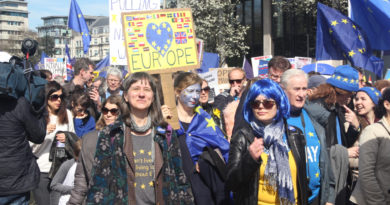What Brexit may look like
Prime Minister Theresa May is expected to reveal the government Brexit strategy in a speech in London, on Tuesday January 17th. Based on information filtered through the media, she will announce that the UK is prepared to leave the single market, the customs union and the European Court of Justice to get full control over immigration.
It is hard to predict what the final Brexit deal will be like. But the Cologne Institute for Economic Research evaluated the positions and concessions that are likely to be made, and anticipated how the future relationship between the UK and the EU may be shaped.
Conflicting positions
The starting point of the analysis is that the UK will still aim to retain as broad access to the EU single market as possible. In exchange for this, the EU typically demands freedom of movement for EU citizens, adoption of EU regulations and net payments to the EU budget.
With regard to free movement for EU citizens, the research assumes that only small concessions will be made by the UK. “The politicisation of the topic in the UK, and the clear position of the British government’s desire to control immigration, leave very little room for larger concessions,” says the report. The authors, Jürgen Matthes and Berthold Busch, believe that the UK and the EU will come to an agreement for citizens who have entered the partner country by a certain date. The UK will then impose reductions on immigration maintaining preferential treatment for highly skilled EU citizens.
The UK is also likely to reduce, but not completely stop, its net payments to the EU budget. This option has already been presented to the public as a way to “buy” access to the single market. As the UK is a net contributor to the EU, a reduction in payments will cause a gap that may hit Germany and other countries, unless the EU budget is cut.
Regarding the adoption of EU laws, the authors argue that current regulations could be kept in place. EU legislation will be transferred into British law with the Great Repeal Bill and, in the financial sector, the UK will remain part of other international arrangements, such as those of the G20 process and the Basel Committee on Banking Supervision. The question mark is about the settling of disputes and the role of the European Court of Justice.
Strengths and weaknesses
In terms of negotiating power, it is often said that the UK has a trade deficit with the EU and plays an important geo-political and military role in Europe. So European countries should be keen to ensure a good deal.
But the EU is a much larger market (in 2015, 44.4% of British exports went to the EU, while 6.5% of EU exports went to Britain), so the UK would be more dependent on reaching an agreement. The UK political and military power could become more significant, especially if the USA will engage less in Europe. “However, it does not seem plausible that a political-military de-coupling would represent a successful strategy for the UK,” says the report. The British position might also be weakened by the views of Scotland and Northern Ireland, which voted to stay in the EU, as their concerns will have to be taken into account.
For the European Union, the main strength is the size of its market. In addition, it is clear that its room for negotiation is limited, as being generous with the UK would lead other EU members to seek similar arrangements and encourage EAA states and Switzerland to ask for an improvement of their deals. The EU negotiating position is also reinforced by the fact that each member will probably have to vote on the final agreement. For Central and Eastern European countries, for example, free movement of people and contributions to the EU budget are very important.
Manufacturing or finance?
All considered, the report comes to a number of assumptions on how the UK access to the single market might be shaped in the future.
The UK is expected to leave the customs union (an area without custom duties but with common external tariffs) because in this way the British government will be able to make free trade agreements with third countries.
For access to the free movement of goods and services in the EU, the UK will probably have to make significant concessions and according to the authors of the report, what Britain seems to be prepared to give at present is not sufficient. Based on this analysis, the government may be confronted with the choice of prioritising free movement for industrial goods or for financial services.
The report says that in terms of economic significance, the manufacturing sector (10% of gross added value and 8% of workforce) outweighs finance (7% of added value and 4% of workforce). The City has a lot of influence, but the industry is more distributed across the country and therefore affects more constituencies. Further, the referendum showed the dissatisfaction in industrial regions while the image of the financial sector is still tainted by the financial crisis.
If the government were to opt for free access for industrial goods, the UK may agree to contribute to the EU budget and to the harmonisation of product standards accepting EU regulations. However, considering the disproportionate size of the EU market, researchers add: “Given the huge significance of free movement of people for the EU, these concessions would probably not suffice by far. Thus, it seems plausible that a large part of the UK’s significant political and military role will need to be brought in as a trade off […] in this virtual balancing act.”
As regards free movement of services, the EU has traditionally been quite restrictive. For example, it does not grant passporting arrangements to the Swiss financial sector, despite its strength. Other EU countries may also hope to enhance their financial centres at London’s expense.
The authors conclude offering two possible scenarios. In the first, the EU stands by the indivisibility of the four basic freedoms (freedom of movement of goods, services, capital and people) and access to the internal market. This would mean that the UK could only maintain the passporting for financial services with large concessions on free movement of people. The second, considered more likely, is to establish an enhanced version of a free trade agreement, with mutual recognition and sufficiently harmonised rules and standards, while free movement of services would remain restricted.
Fair negotiations
The authors argue that “the British public debate will most likely feature the EU as being unfairly strict on the UK.” But the EU should adhere to a principle of reciprocity and “make it clear to the British public that significantly reduced British concessions will also limit access to the single market in important areas.”
They conclude: “If this conflict of objectives is clearly set out – unlike in the referendum campaign – the British people can decide whether the sovereignty gained by leaving the EU is worth the costs of less economic integration with the EU.”
The full report is available here.
Claudia Delpero © all rights reserved.
Photo by Hernán Piñera from Marbella [CC BY-SA 2.0], via Wikimedia Commons.
Revised on 16 January 2017.





